- Home
- Lynne Connolly
Venice
Venice Read online
Venice
Richard and Rose, Volume 3
Lynne Connolly
Published by LMC Publications, 2018.
This is a work of fiction. Similarities to real people, places, or events are entirely coincidental.
VENICE
First edition. August 14, 2018.
Copyright © 2018 Lynne Connolly.
ISBN: 978-1386059417
Written by Lynne Connolly.
Table of Contents
Title Page
Copyright Page
Venice (Richard and Rose, #3)
Chapter One
Chapter Two
Chapter Three
Chapter Four
Chapter Five
Chapter Six
Chapter Seven
Chapter Eight
Chapter Nine
Chapter Ten
Chapter Eleven
Chapter Twelve
Chapter Thirteen
Chapter Fourteen
Chapter Fifteen
Chapter Sixteen
Chapter Seventeen
Chapter Eighteen
Chapter Nineteen
Chapter Twenty
Chapter Twenty-One
Look for these titles
Further Reading: Devonshire
Richard and Rose, Book 3
At long last, it is Lord and Lady Strang’s wedding day. Yet no sooner do Richard and Rose leave their wedding breakfast than two shots ring out, forcing a hasty change in honeymoon plans. Instead of traveling together by yacht, Richard goes on ahead, making sure the road to Venice is safe for his beloved.
Rose is by no means alone, however. Along her journey by packet, coach, even mule, she befriends a charming young couple, the Ravens, who have a strange confession to make. They claim they are traveling incognito—and are really the newlywed Lord and Lady Strang!
Once reunited in Venice, Richard and Rose heat up the sheets, making Richard consider the delightful possibility of keeping his wife in bed for the rest of their stay. Except Venice is as full of knaves as London, and one of them is still trying to find them with a bullet.
The Ravens could hold the key to the assassination attempts. Or perhaps they are playing a deadly game of their own...
Dedication
To the curators of the Victoria and Albert Museum—thank you for your help. As always, it was invaluable.
Acknowledgments
Many thanks to Joanne Renaud, who painted the gorgeous portrait of Richard and Rose that will appear on every cover.
Chapter One
WHEN THE FIRST LIGHT of dawn filtered through the curtains at the window, I gave up trying to sleep and dressed in a loose sacque, well out of date and faded with washing but comfortable. I sat in a stiff-backed chair by the window and watched my wedding day arrive.
The sun crept over the fields past our orchards, stretching its tentacles across the sky to herald the new day. This, to me, was a day like no other, but to most people in the world, today would be the same as yesterday, the same as tomorrow.
It marked the last day in my old room. I moved into it when I left the nursery and it witnessed my hopes fading and my dreams giving way to hard reality.
My brother, James, now the Earl of Hareton, had grandiose plans for this simple manor house, and this floor would form part of the new State Rooms.
Everyone had packed to leave this old house. James had rented a house nearby, as this one wouldn’t be habitable for some time. I had lived here all my life and found leaving harder than I’d imagined.
A comfortable family home, Hareton Manor wasn’t a special-looking house. Less than a hundred years old but unique to us, the Golightlys. I knew all the hiding places, which stairs creaked, and which doors didn’t fit properly. I remembered all the items I’d dropped through the floorboards in the nursery, the thin ivory counters of a game I hated and some small coins, to bribe the fairies and elves I was certain lived under them.
Some rooms held my misery, like the day not so long ago when I realised I might remain on the shelf, a respectable spinster for the rest of my days. Only that room had seen my tears when I thought I would never leave this house, and now it would be destroyed, together with my misery.
Dawn is such a melancholy time.
I wished it were tomorrow, with everything over. No one, not even my betrothed, must see how much I dreaded the day. With spinsterhood came welcome anonymity. So many times I had watched attention slide over me and on to the next person. I had become used to the lack of regard, even welcomed it sometimes, but today I would be the centre of attention. Today was my day.
Anonymity had its blessings.
My wedding dress faced me in mute challenge. Arranged on a figure in the middle of the room, it awaited its owner—surely not me. Blue satin, silver embroidery and diamonds were surely meant for my lovely sister Lizzie, not me.
Here, in my last moments of self-indulgence I could admit that I was terrified, afraid I would let everybody down—afraid I wouldn’t do what so many people expected of me. I had courage but it didn’t extend to appearing as the centre of attention before so many people. I was moving out of my comfortable childhood milieu into a much larger world, one where I knew hardly anyone—my youthful nightmares come true.
When I shivered, I realised that late April or not, the morning held a chill, so I decided to find somewhere warmer.
Only one place qualified at this time of day. The kitchen. But when I set my foot down I heard an ominous crunch. My watch. The old watch I’d laid by my side had fallen and I’d trodden on it. I picked up the pieces, blinking away the tears. I would not cry on this day. But when I laid them on the nightstand it seemed like a reminder that my old life had gone forever, never to return.
After today this would not be my room, or my home. And I would have to buy a new watch.
I left my old bedroom and hurried down the back stairs to the kitchen.
The glowing fire in the grate and the hum of activity reminded me just how early a maid’s day started. The maid-of-all-work, grubby and tousled, resplendent in her sacking apron and wooden clogs, started when I went in but the cook, Mrs. Tiree, smiled in welcome. “Good morning, Miss Rose. Come and sit by the fire, and I’ll make you a dish of tea.”
I sat on the comfortable wooden chair she pulled up invitingly for me. I could hardly see the chair for its colourful, unmatched cushions, and settling into it was like settling into a soft cocoon. I might never have been away.
I stretched my feet in front of the fire and enjoyed the company of the cook, who, in days long gone, had made me gingerbread men and comforted me when I ran away from my nurse and got into yet another scrape.
I accepted the proffered dish of tea gratefully, held it between both my hands and sipped the steaming liquid. It was kitchen tea, supposedly inferior to the sort we had upstairs but it tasted good and it flowed down my throat to warm my chilled insides.
Leaning back, I watched the maids preparing for the new day. Since the feast to celebrate the ceremony wouldn’t be held here but at the neighbouring larger house of Peacock’s, it was like any other day. Preparations for the family breakfast were well under way, even though it was barely six. Maids bustled about, beating eggs, slicing kidneys, and the kitchen filled with the aroma of baking bread. My sister-in-law, Martha, was one of the best housekeepers I knew, and she’d done her best to pass on her skills. I was a better study than my sister, Lizzie, though that wasn’t saying a great deal.
The cook talked to me while she worked on the great table by the fire, facing the room to keep an eye on the activity around her. “You’ll be wanting an early breakfast this morning, miss. Lady Hareton’s ordered it for eight, so you can set out for the Cathedral bright and early.”
I smile
d mechanically. “I don’t think I’ll be eating much, Mrs. Tiree.”
She took my empty tea dish and put it on the table. “Don’t you worry, Miss Rose. It’ll soon be over.” Her busy hands stilled in the mixing bowl. “Is that what’s worrying you, Miss? What happens after?”
I shook my head. “No, Mrs. Tiree. I don’t like to be the centre of attention, that’s all.”
“If you do what you’re supposed to do, and hold your head up, nobody will notice.”
That was probably the best advice anyone had given me. Through no fault of my own, I had missed the wedding rehearsal, and although I’d read the wedding service until I knew it by heart, so I knew when to stand, when to sit, and what to say, the thought sent tension tingling along my backbone. I could do nothing else now except send up a prayer of my own.
That time in the kitchen settled me and I could face the day with more equanimity. Mrs. Tiree had never done anything not eminently practical, never given advice that didn’t have a firm root in day-to-day living. She could sense my fear since she knew me so well, and she didn’t try to deny it as other people did. She was someone else I would miss.
My new maid came into the kitchen then, and peered at me before she recognised me and dropped a curtsey. My future husband had found her for me, a lady’s maid and my bodyguard, hired to protect me from the dangers of my new world. I expected a superior dragon of a woman, and in a way, I was right. Adele Nichols could be formidable, but she surprised me with her forthright attitude. Perhaps she had seen more of life than the average lady’s maid. I wouldn’t be in the least surprised.
Nichols was slightly taller than me, and I was considered gangling by county society. She had a soft smile for such a hard-faced woman, and had first won my approval by dressing my unruly hair faster and better than anyone else I had ever met, without pulling too hard at my curls in the process.
My recent adventures had left me with a number of painful bruises, and Nichols had anointed them with a potion of her own devising that had eased the discomfort, and helped them to fade. However, I had reached the worse stage, when the black was just beginning to fade into greenish yellow. The red welts on my wrists were a worse problem, but I would cover them with lace ruffles, and no one would be any the wiser. Except my husband-to-be, and he’d already seen them.
“I’ll have the fire lit upstairs, madam, and then you can come and sit in the warm,” she said now.
“I’ll have some more tea and then I’ll come up.”
Nichols inclined her head, collected her breakfast on a tray, and went out.
“She asked for something on a tray because she won’t be able to come down for the regular kitchen breakfast,” Mrs. Tiree informed me, her tones deliberately neutral.
“What do you think of her?” I wouldn’t normally consider asking a servant that kind of question, having been brought up to avoid kitchen gossip, but Mrs. Tiree was different.
Mrs. Tiree put down her rolling pin and gave me her full attention. “To be truthful, Miss Rose, she’ll do well by you. She’s only been here two days, and she was with a marchioness before, but she’s not shown any sort of superiority, the sort you’d expect from a London maid, and she keeps her own counsel. I don’t think she’s always been a lady’s maid, though.”
“I thought that too.”
I didn’t go back upstairs until I had eaten a bread roll, fresh from the oven, a treat I had always loved. Mrs. Tiree was concerned to see me eat. “Many brides don’t eat until the wedding breakfast, and that’s the reason they faint at the altar. They’re asked to stand, and sit, and kneel, and the lack of food makes them unwell. I should think that’s the last thing you’ll want, Miss Rose.”
I had to agree, and that made me determined to make a good breakfast. It was true brides frequently fainted at the altar rail, but this was usually explained by their sensibilities being overcome at the thought of the ordeal ahead, not by the lack of food that morning. It was typical of the cook to look for the practical solution, and it was also typical of her that she might very well be right.
I had to go upstairs. Time was getting on and the house was waking up.
My hour in the kitchen had done me more good than staying in bed fretting, and I felt much more myself by the time I returned to my room.
The silent room I had left was no more. Nichols controlled it now. My sister had arrived, sleepily sitting on the bed, still in her wrapper.
“Morning,” said Lizzie, as she had when we were children and shared a bed.
“Morning,” I answered her, smiling.
“Ruth has taken over our bedroom, as if she’s the bride, so I thought I’d give her some space. Do you mind?”
“No, but won’t you need more time?” Lizzie loved to take her time getting ready.
“I have my own preparations in hand. Never fear, I’ll return and eject Ruth in a little while but I wanted to see how you are first. So are you ready for your big day?”
“No.”
She laughed. “You should try to enjoy your wedding day. After all, it’s the only one you’re likely to have—it’s not as if you’re marrying an old man in his last decade.”
Far from it.
I sat at my dressing table and let Nichols dress my hair. I was to have it powdered today, a process I disliked intensely, but there was no getting out of it, it had to be done. Nichols combed out all the unruly curls and smoothed pomade over them so the powder would stick. Then we went into the dressing room and I held the cloth over my face and tried not to cough from the fine powder flying in the air.
When we went back into the bedroom, Lizzie had gone, no doubt to get herself ready and eject Ruth from her place at the dressing table. Nichols drew out the chair for me. “Let your mind rest, madam, and I’ll do what’s necessary.” She laced my stays tight, tied my garters, and put on my side hoops and petticoats in blessed silence. When she lifted the pocket to tie about my waist I stopped her, rummaging around on the dressing table and in the drawers until I found my old necessaire, the tiny container that held, amongst other things, a chipped mirror and a ruined pair of scissors. “It’s a good luck talisman,” I explained, and Nichols waited while I slipped it into my pocket—a familiar item to keep me company during the day.
The time came for the outer garments. The blue petticoat was first, with its miraculous embroidery, and then the stomacher, relatively plain since it would hold a graduated row of diamond brooches. Nichols held the gown for me. It was a formal mantua, the pleats at the back shaping my body perfectly, made by the best mantua maker in Exeter, a miracle of heavy blue satin and silver embroidery. I stood still while Nichols hooked and pinned me in, and then pulled out the fine lace to fall in frothy waterfalls at my elbows and bosom.
I had not yet seen myself in the long mirror, but I looked now. Even without the jewellery, someone I hardly recognised stared back at me. Here stood an elegant society lady, one who knew instinctively how to stand and pose, one who was used to the fine things of life, who had never climbed trees and frolicked on beaches, who would never dream of ruining her complexion by going out in the sun without a parasol. We looked solemnly at each other, that lady and I, and curtseyed to each other, the wide skirts making expensive susurrations in the silence of the room.
Nichols examined me, scrutinising her work for flaws. Eventually she came forward, arranged the set of the skirt, and smiled. “You’re every inch the great lady, ma’am.” She came around to the front, adjusting a pin here, a frill of lace there. “Now I think you should go down to breakfast, and then we’ll finish off with the diamonds. Please try to eat something, it’s a long time before you’ll sit down to eat again.”
She meant well, but the worms gnawed at my innards again at the reminder.
I PASSED MUSTER. EVERYONE, including fashion-aware Lizzie, said I would do very well. They watched me enter the room, and I stood while they took in my new glory. James made no comment. Martha decided I would do well enough in front of the large co
ngregation in Exeter Cathedral.
I opted to eat my breakfast with a large white kitchen apron covering my finery, right up to my neck. Getting egg stains on my gown didn’t bear thinking about, and I would much rather appear foolish here at home than in front of half of polite society later. My young nephews and niece were allowed downstairs to eat their last family meal with me and that, together with everyone in various stages of dress, led to an atmosphere of informality and near hilarity that I hadn’t expected at all.
Martha wore her gown and petticoat, but not her jewellery. Lizzie was mostly dressed, but had left off her gown and worn a wrapper for the meal. None of the children were properly dressed, Martha wisely depending on the efficiency of the nursery maids to dress them later rather than risk their aim with their food.
James was in his shirt sleeves. His handsome face broke into a broad smile when the maid tied the apron around my neck. “You look like a very large baby.”
It made me smile too, and the tense mood broken, I found I could make a tolerable breakfast. “I’m as nervous as a baby,” I confessed.
“So am I.” James was to give me away. This amounted to his first formal duty as Lord Hareton. We grinned at each other in sympathy.
“I can’t remember ever seeing a nervous baby,” Martha commented, ever practical. “Nervousness arrives later, after a child has been taunted or hurt. Just remember, my dear, it’s your day and you should try to enjoy it. You may never get another one.”
“Please God I don’t,” I said fervently.
“Amen to that,” answered James and my younger brother Ian at the same time. With a grin, Ian leaned across the table and linked the little finger of his right hand with James’s, an old gesture used by people in our district when they said the same thing at the same time. It was supposed to grant a wish. Our family link grew closer, and we siblings enjoyed this reminder of our childhood spent in this house.

 Boundless (The Shaws)
Boundless (The Shaws) Sinless (The Shaws)
Sinless (The Shaws) The Girl with the Pearl Pin
The Girl with the Pearl Pin Hosts to Ghosts Box Set
Hosts to Ghosts Box Set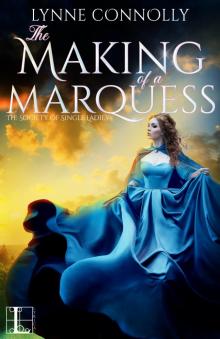 The Making of a Marquess
The Making of a Marquess Boundless
Boundless Beauty of Sunset
Beauty of Sunset Virginia And The Wolf
Virginia And The Wolf Department 57: Bloody Crystal
Department 57: Bloody Crystal Temptation Has Green Eyes
Temptation Has Green Eyes Forged by Love: Even Gods Fall in Love, Book 4
Forged by Love: Even Gods Fall in Love, Book 4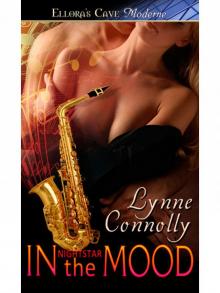 IntheMood
IntheMood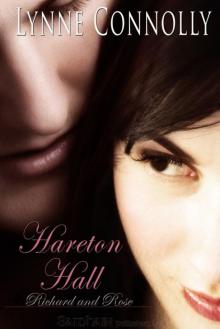 Hareton Hall: Richard and Rose, Book 6
Hareton Hall: Richard and Rose, Book 6 ShiftingHeat
ShiftingHeat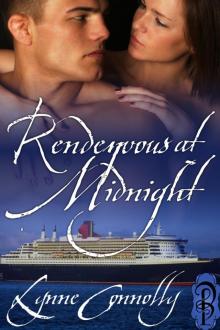 Rendezvous at Midnight
Rendezvous at Midnight Yorkshire: Richard and Rose, Book 1
Yorkshire: Richard and Rose, Book 1 Lisbon: Richard and Rose, Book 8
Lisbon: Richard and Rose, Book 8 Devonshire: Richard and Rose, Book 2
Devonshire: Richard and Rose, Book 2 Venice
Venice War Chest: Even Gods Fall in Love, Book 5
War Chest: Even Gods Fall in Love, Book 5 Dilemma in Yellow Silk (Emperors of London)
Dilemma in Yellow Silk (Emperors of London) BornontheBayou
BornontheBayou Dauntless (The Shaws)
Dauntless (The Shaws) Brutally Beautiful
Brutally Beautiful Lightning Unbound: Even Gods Fall in Love, Book 1
Lightning Unbound: Even Gods Fall in Love, Book 1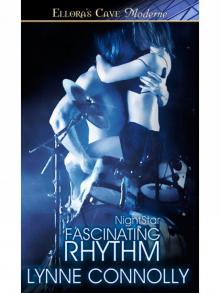 FascinatingRhythm
FascinatingRhythm Fearless
Fearless A Chance to Dream
A Chance to Dream Mad for Love: Even Gods Fall in Love, Book 2
Mad for Love: Even Gods Fall in Love, Book 2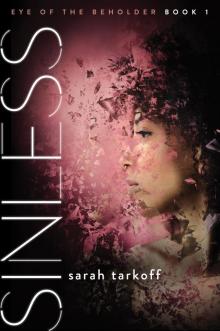 Sinless
Sinless SailtotheMoon
SailtotheMoon Wild Lavender
Wild Lavender Department 57: Rubies of Fire
Department 57: Rubies of Fire Maiden Lane
Maiden Lane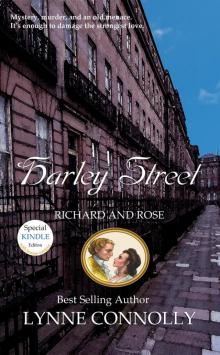 Harley Street
Harley Street Dauntless
Dauntless NicenEasy
NicenEasy It Started at Waterloo
It Started at Waterloo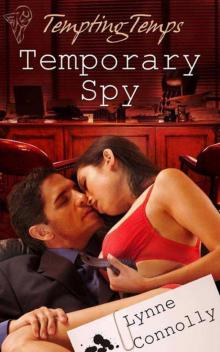 Temporary Spy
Temporary Spy BorntobeWild
BorntobeWild Dilemma in Yellow Silk
Dilemma in Yellow Silk Yorkshire
Yorkshire The Thorndykes 1: Dispossessed
The Thorndykes 1: Dispossessed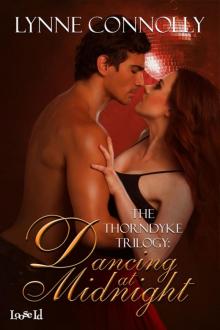 The Thorndyke Trilogy 2: Dancing at Midnight
The Thorndyke Trilogy 2: Dancing at Midnight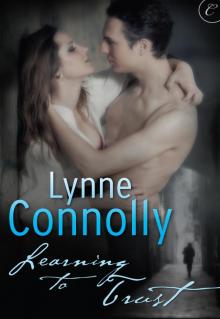 Learning to Trust
Learning to Trust Her Quicksilver Lover: Even Gods Fall in Love, Book 6
Her Quicksilver Lover: Even Gods Fall in Love, Book 6 Loving Lucy
Loving Lucy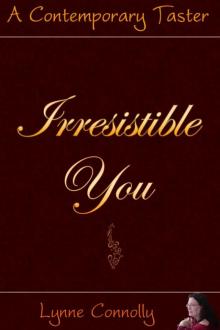 Irresistible You
Irresistible You Arrows of Desire: Even Gods Fall in Love, Book 3
Arrows of Desire: Even Gods Fall in Love, Book 3 Unbroken
Unbroken Devonshire
Devonshire Reckless in Pink
Reckless in Pink Rogue in Red Velvet
Rogue in Red Velvet